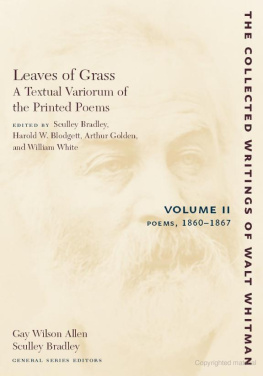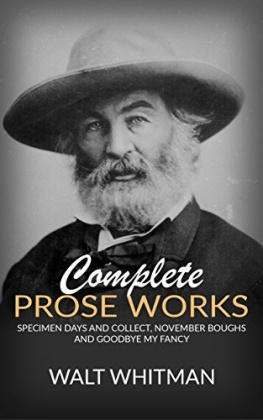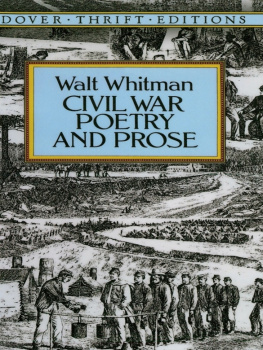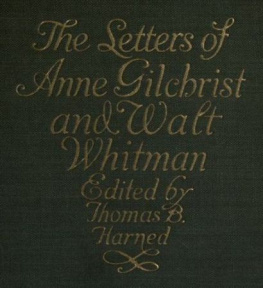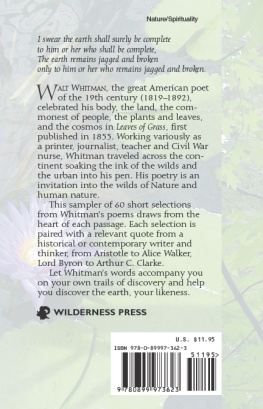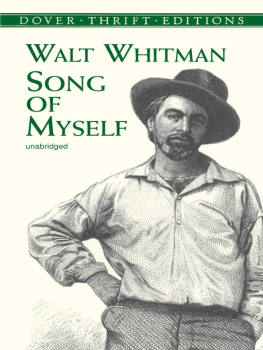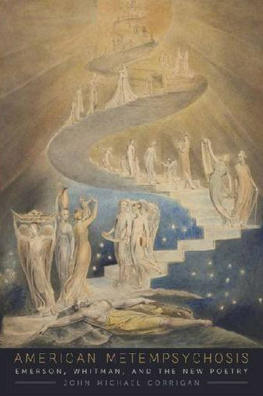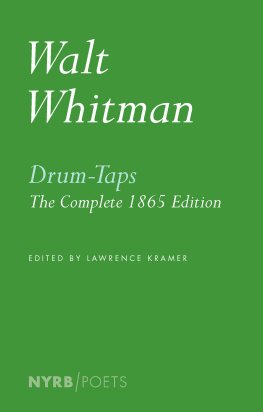
Book 1.
Inscriptions.
Ones-Self I Sing
Ones-self I sing, a simple separate person, Yet utter the word Democratic, the word En-Masse.
As I Ponderd in Silence
As I ponderd in silence,
Returning upon my poems, considering, lingering long, A Phantom arose before me with distrustful aspect, Terrible in beauty, age, and power,
The genius of poets of old lands,
As to me directing like flame its eyes,
With finger pointing to many immortal songs,
And menacing voice, What singest thou? it said, Knowst thou not there is hut one theme for ever-enduring
bards?
And that is the theme of War, the fortune of battles, The making of perfect soldiers.
Of physiology from top to toe I sing,
Not physiognomy alone nor brain alone is worthy for the Muse, I say the Form complete is worthier far, The Female equally with the Male I sing.
Of Life immense in passion, pulse, and power, Cheerful, for freest action formd under the laws divine, The Modern Man I sing.
Be it so, then I answerd,
I too haughty Shade also sing war, and a longer and greater
one than any,
Waged in my book with varying fortune, with flight, advance and retreat, victory deferrd and wavering,
(Yet methinks certain, or as good as certain, at the last,) the field the world,
For life and death, for the Body and for the eternal Soul,
Lo, I too am come, chanting the chant of battles,
I above all promote brave soldiers.
In Cabind Ships at Sea
In cabind ships at sea,
The boundless blue on every side expanding,
With whistling winds and music of the waves, the large imperious waves,
Or some lone bark buoyd on the dense marine,
Where joyous full of faith, spreading white sails, She cleaves the ether mid the sparkle and the foam of day, or
under many a star at night,
By sailors young and old haply will I, a reminiscence of the land, be read,
In full rapport at last.
Then falter not O book, fulfil your destiny,
You not a reminiscence of the land alone,
You too as a lone bark cleaving the ether, purposd I know not whither, yet ever full of faith,
Consort to every ship that sails, sail you!
Bear forth to them folded my love, (dear mariners, for you I fold it here in every leaf;)
Speed on my book! spread your white sails my little bark athwart the imperious waves,
Chant on, sail on, bear oer the boundless blue from me to every sea,
This song for mariners and all their ships.
Here are our thoughts, voyagers thoughts,
Here not the land, firm land, alone appears, may then by them be said,
The sky oerarches here, we feel the undulating deck beneath our feet,
We feel the long pulsation, ebb and flow of endless motion,
The tones of unseen mystery, the vague and vast suggestions of the briny world, the liquid-flowing syllables,
The perfume, the faint creaking of the cordage, the melancholy rhythm,
The boundless vista and the horizon far and dim are all here,
And this is oceans poem.
To Foreign Lands
I heard that you askd for something to prove this puzzle the New World,
And to define America, her athletic Democracy,
Therefore I send you my poems that you behold in them what you wanted.
To a Historian
You who celebrate bygones,
Who have explored the outward, the surfaces of the races, the life that has exhibited itself,
Who have treated of man as the creature of politics, aggregates, rulers and priests,
I, habitan of the Alleghanies, treating of him as he is in himself in his own rights,
Pressing the pulse of the life that has seldom exhibited itself, (the great pride of man in himself,)
Chanter of Personality, outlining what is yet to be,
I project the history of the future.
(A war O soldiers not for itself alone,
Far, far more stood silently waiting behind, now to advance in this book.)
Thou orb of many orbs!
Thou seething principle! thou well-kept, latent germ! thou centre!
Around the idea of thee the war revolving,
With all its angry and vehement play of causes,
(With vast results to come for thrice a thousand years,)
These recitatives for thee,my book and the war are one,
Merged in its spirit I and mine, as the contest hinged on thee,
As a wheel on its axis turns, this book unwitting to itself,
Around the idea of thee.
To Thee Old Cause
To thee old cause!
Thou peerless, passionate, good cause,
Thou stern, remorseless, sweet idea,
Deathless throughout the ages, races, lands,
After a strange sad war, great war for thee,
(I think all war through time was really fought, and ever will
be really fought, for thee,)
These chants for thee, the eternal march of thee.
Eidolons
I met a seer,
Passing the hues and objects of the world, The fields of art and learning, pleasure, sense,
To glean eidolons.
Put in thy chants said he,
No more the puzzling hour nor day, nor segments, parts, put in, Put first before the rest as light for all and entrance-song of all,
That of eidolons. The whole or large or small summd, added up,
In its eidolon.
Ever the dim beginning,
Ever the growth, the rounding of the circle,
Ever the summit and the merge at last, (to surely start again,)
Eidolons! eidolons!
The old, old urge,
Based on the ancient pinnacles, lo, newer, higher pinnacles, From science and the modern still impelld,
The old, old urge, eidolons.
Ever the mutable,
Ever materials, changing, crumbling, re-cohering, Ever the ateliers, the factories divine,
Issuing eidolons.
The present now and here,
Americas busy, teeming, intricate whirl,
Of aggregate and segregate for only thence releasing,
To-days eidolons.
Lo, I or you,
Or woman, man, or state, known or unknown, We seeming solid wealth, strength, beauty build,
But really build eidolons.
These with the past,
Of vanishd lands, of all the reigns of kings across the sea, Old conquerors, old campaigns, old sailors voyages,
Joining eidolons.
The ostent evanescent,
The substance of an artists mood or savans studies long, Or warriors, martyrs, heros toils,
To fashion his eidolon.
Densities, growth, facades,
Strata of mountains, soils, rocks, giant trees, Far-born, far-dying, living long, to leave,
Eidolons everlasting.
Of every human life,
(The units gatherd, posted, not a thought, emotion, deed,
left out,)
Exalte, rapt, ecstatic,
The visible but their womb of birth,
Of orbic tendencies to shape and shape and shape,
The mighty earth-eidolon. Sweeping the present to the infinite future,
Eidolons, eidolons, eidolons.
All space, all time,
(The stars, the terrible perturbations of the suns, Swelling, collapsing, ending, serving their longer, shorter use,)
Filld with eidolons only.
The noiseless myriads,
The infinite oceans where the rivers empty, The separate countless free identities, like eyesight,
The true realities, eidolons.
Not this the world,
Nor these the universes, they the universes, Purport and end, ever the permanent life of life,
Eidolons, eidolons.
Beyond thy lectures learnd professor,
Beyond thy telescope or spectroscope observer keen, beyond
all mathematics,
Beyond the doctors surgery, anatomy, beyond the chemist
with his chemistry,
The entities of entities, eidolons.
The prophet and the bard,
Shall yet maintain themselves, in higher stages yet, Shall mediate to the Modern, to Democracy, interpret yet to
them,
God and eidolons.
And thee my soul,
Joys, ceaseless exercises, exaltations,
Thy yearning amply fed at last, prepared to meet,
Thy mates, eidolons.
Next page
